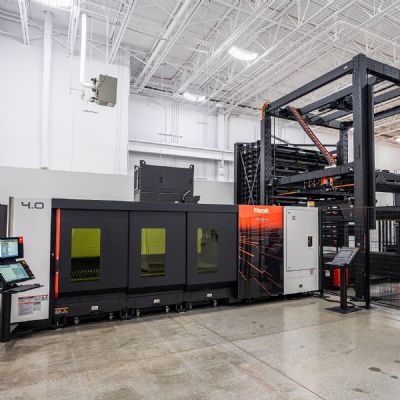AI in Manufacturing Makes Impressions at INTECH
April 17, 2024Comments
Artificial intelligence was the hottest topic discussed at INTECH, which Trumpf hosted in Germany earlier this week, and at a post-event press conference yesterday.
Artificial intelligence was the hottest topic discussed at INTECH, which Trumpf hosted in Germany earlier this week, and at a post-event press conference yesterday.
AI is the key to greater productivity and competitiveness in industrial manufacturing because it helps fabricators and metal formers evaluate machine data more efficiently, detect errors, and automate production, the technology manufacturer says.
 “In the last couple of years, we have invested a lot of time and capacity to evaluate AI’s potential and brought AI into our products and our processes, says Stephan Mayer, Trumpf CEO for Machine Tools. AI will play a bigger role in Trumpf’s future strategy so that customers can run the company’s machines at the highest possible uptime and maximum OEE, Mayer claims. “We see that, with our conventional technology, we are reaching a certain limit. We need a closer connection to the machine, and that means we need a direct connection to the machines in the field.
“In the last couple of years, we have invested a lot of time and capacity to evaluate AI’s potential and brought AI into our products and our processes, says Stephan Mayer, Trumpf CEO for Machine Tools. AI will play a bigger role in Trumpf’s future strategy so that customers can run the company’s machines at the highest possible uptime and maximum OEE, Mayer claims. “We see that, with our conventional technology, we are reaching a certain limit. We need a closer connection to the machine, and that means we need a direct connection to the machines in the field.
“AI isn’t magic,” Mayer adds. “It’s very good at recognizing repeating structures, repeating patterns—pictures, texts, videos, sound … and based on this recognition, AI can make statistical decisions. It offers a method to automate and to speed up operations.”
Mayer offers five examples where AI can be effectively applied to manufacturing: preventive maintenance, quality control, composing reports, improving automation, and in determining which parts can be run unattended.
Preventive maintenance. AI can recognize a problem by watching parameters, such as if the laser heats up faster than expected, or if dirt is reflecting light, indicating that it needs preventive maintenance. “AI can alert us so we can contact the customer that we detected an error, if mistakes in programming are being made, or that the machine speed can be adjusted for optimal speed. AI is an enabler to this next step.” Mayer states.
Quality control. AI can help monitor system data and visually inspect products with a camera, such as welding seams to check that they are not defective.
Language composition. A third example is applying language to write reports post-service, similar to Chat GPT. Those reports can be accessed again to provide assistance to another, similar service problem to speed up the right resolution.







